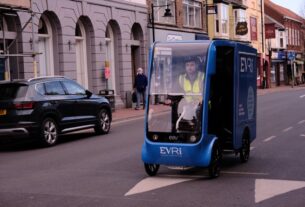“People have been working really hard on their driving behaviours, idling time and reducing their carbon output already,” says James Wyatt from Webfleet Solutions, during an exclusive video interview with The Logistics Point. Wyatt spoke to us about decarbonisation, what companies need to do and how technology can help their efforts. Watch the full video now.

Legislation has been pushing people to change and many companies are realising the need to act now. At the same time, Wyatt says organisations do not always realise how small changes in their behaviour can turn into big savings.
In addition, supply chain and transport managers also need to work on their own goals and set KPIs that could track the work being done.
Being efficient
“Transport has a big incentive to be efficient and sustainable,” Wyatt comments. It is in its own interest to implement solutions that could save costs and make it more sustainable. Technology can certainly help, Wyatt believes. Solutions that track the performance of
vehicles and drivers are being installed, informing fleets what is happening and how drivers’ behaviour is affecting the bottom line.
New legislation has also forced organisations to have more serious conversations, see what technologies are out there and how they can be implemented to reduce emissions. Telematics has become an important consideration here, furnishing transport companies with more information about fuel consumption, the way vehicles are being used and what this means from a financial perspective.
People’s behaviour can be the hardest to change. Wyatt recalls times when he would work with drivers who, without realising it, would have their engines running for 15 minutes, even when they knew they would not be going anywhere. Such behaviour is hard to fix but Wyatt is certain professional drivers want to know how to improve their working practices, and are ready to listen.
The other hurdle is working with managers. Often Wyatt would suggest to organisations to install monitoring systems and to do nothing initially. By taking this approach, they could record what happens when they do not take any steps to control idling times. On many occasions, organisations could make substantial savings just by asking drivers to turn off their engines. Managers find the information surprising, and eye opening.
“People don’t always know what each action costs them,” Wyatt explains.
Providing the data serves as an incentive. Massive savings can be achieved in the scheduling process too. Wyatt considers how EVs will change the way we think about decarbonisation. Could it mean an increase in collaboration between more companies to ensure vehicles are properly charged?
Watch the full video with James Wyatt now and learn more about how technology is helping decarbonisation efforts, how EVs are affecting the market and what are the costs when you do not take any actions to change behaviour. ✷


